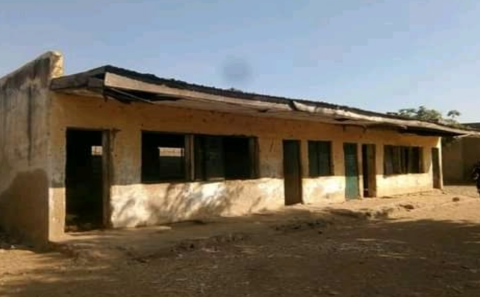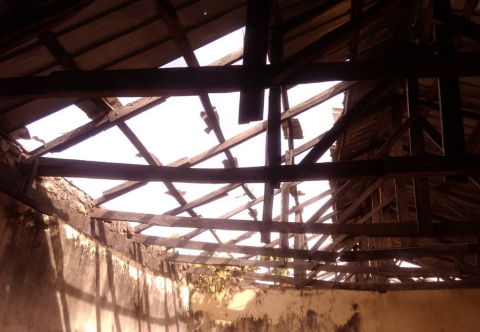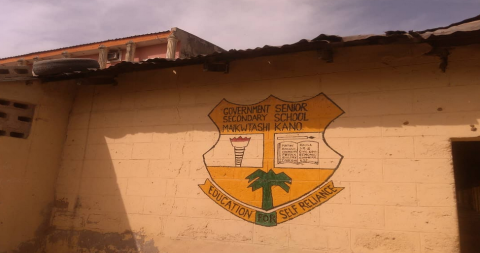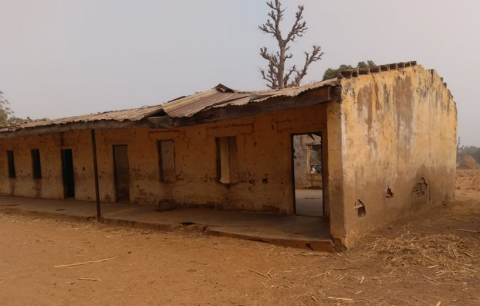
The Kano State government recently disbursed N20 million each to all the local government areas in the state to renovate public schools. In his fourth report on the state of public schools in the state, Abdulmalik Lukman reports that the money is not enough because most public schools have gone to ruins.
Galinja Special Primary School in Madobi Local Government of Kano State is an eyesore. Hundreds of pupils are crammed in three classes where they sit on the floor.
Despite the community producing many political leaders in the state, the school has been largely neglected by the government.

A teacher at the school, who spoke on the condition of anonymity because he was not authorised to talk to the press, lamented how the pupils had been denied quality primary education.
"The block has only three classes, and we have a large population of students, which is not convenient for them. Studies become hard for both teachers and students due to lack of provision of educational facilities by the government," the teacher said.
"We tried enough to see more blocks are built. Elders of the community have proposed suggestions but all promises were abortive," he added.

A parent, Abdulkarim Salisu Maijigiri, told SaharaReporters his three children are in the school because he has no other option.
"Our children's performance is very poor. Simple arithmetics, they can't solve not to talk of constructing a good sentence."
The village head of Galinja Galadima said the school lacks Insufficient teachers, well-constructed buildings and teaching materials.
"Despite the harmattan in Kano State, students still strived to attend classes but still the situation is not conducive due to open windows and broken ceiling," he said. "Quick intervention of the state government is required. "The money disbursed for renovations of schools in various communities has not been implemented accurately, as only a few schools were just repainted and retouched.

But the appalling conditions of public schools in the state are not only apparent in rural areas. Urban public schools are also suffering from the government's neglect.
Zawai Primary and Secondary School, Fagge is located in the Kano metropolis and it is dilapidated. The roofs have caved in, posing life-threatening danger to the students. About four blocks in the school have fallen apart and the remaining blocks are unfit for learning. While in class, students are exposed to the sun and rain.

A community leader, Ali Ahmed, said the government had abandoned public schools in Fagge Local Government Area as they lack classes, reading materials and qualified teachers.
"We kept asking where are the allocated budget of education of our local government, but they keep saying the government is working towards ensuring good education, but for over decade, the government is yet to act on its promises," Ahmed said.
"Some students are naturally gifted while some are low average learners, but even the genius ones are performing badly due to no quality education to support their intelligence. It is sad to see that the primary three students can't recite alphabets correctly."

Another neglected school in Fagge is Governor Senior Secondary Secondary Maikwatashi, one of the major public schools in the area.
The school has hundreds of students who attend either morning and afternoon sessions because of poor and inadequate facilities.
Students, who spoke to our correspondent, said the teachers are not qualified. "Most of the time, we find it difficult to comprehend what a teacher is teaching because some of the teachers lack teaching skills," one of the students said.

A teacher, who preferred to be anonymous, agreed that most of the school teachers are not qualified, adding that the method of recruitment by the politicians should be blamed.
"Some are just appointed due to their submission to government during struggles to be in power," he said. "The government compensates most of these unprofessionals with teaching jobs in some public schools in Kano, especially in rural areas. It is so unfortunate to see an English teacher who can't even speak a well-constructed sentence. How do we expect the children to learn?"

At Kwamarawa Primary School Bichi Local Government Area, the buildings have collapsed, exposing the pupils to untold hardship.
Some government officials have visited the school and promised that the rehabilitation would soon be carried out. However, some insisted that the N20 million the state gave to each local government for renovation is like a drop in the ocean due to the infrastructural decay in public schools.

Ahmad Saye, an activist in Bichi, said the government has to improve public education in the state.
"Currently, some funds have been disbursed, some schools were retouched and renovated while some other schools are still in their unwanted situations," Saye said. "We are still pushing to see all goals are achieved towards ensuring sound education to our pupils."

Another school, Limanci Primary School in Karaye Local Government Area, Kano, is equally in a pitiable situation. The buildings have collapsed, and pupils are forced to sit in the open to learn.
"Out of the funds disbursed, only the schools within Karaye metropolis were renovated, while the ones in the rural areas of local government are kept idle," said Muhammad Auwal, a community leader.

He added that "qualified teachers are needed for better education. Most of the teachers lack techniques and teaching patterns. This has made most students lack diction as well as a sound education."
A parent, who spoke under the condition of anonymity, said, "I decided to enrol my four children to the school to avoid them being illiterate, but it seems the education has no impact on their well being".

"Failure in terms of performance and exposure is discouraging. I urged the government to perfect the system by employing educated and qualified teachers to save our children from the disease of illiteracy."